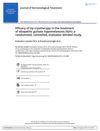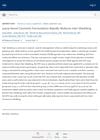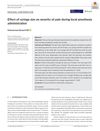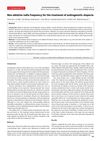 5 citations,
December 2021 in “Journal of Cosmetic Dermatology”
5 citations,
December 2021 in “Journal of Cosmetic Dermatology” QR678 Neo® hair growth treatment is effective for hair loss caused by Covid-19.
December 2022 in “Archives of Dermatological Research” Adding cetirizine to minoxidil improves hair growth and thickness in women with androgenetic alopecia.
18 citations,
October 2015 in “Journal of the European Academy of Dermatology and Venereology” Topical eflornithine helps maintain hair reduction after IPL therapy in women with facial hirsutism.
 September 1997 in “JEADV. Journal of the European Academy of Dermatology and Venereology/Journal of the European Academy of Dermatology and Venereology”
September 1997 in “JEADV. Journal of the European Academy of Dermatology and Venereology/Journal of the European Academy of Dermatology and Venereology” Spironolactone is more effective than finasteride in treating excessive hair growth in women.
 January 2025 in “Journal of Cutaneous Medicine and Surgery”
January 2025 in “Journal of Cutaneous Medicine and Surgery” The combination treatment was more effective for scalp hair regrowth but caused more irritation.
2 citations,
October 2021 in “Journal of Cosmetic Dermatology” Finasteride is more effective and satisfactory than montelukast for treating moderate acne in women.
4 citations,
August 2015 in “JEADV. Journal of the European Academy of Dermatology and Venereology/Journal of the European Academy of Dermatology and Venereology” Both fixed and incremental laser treatments effectively reduced underarm hair, but the fixed method was less painful.
 September 2016 in “Faculty Opinions – Post-Publication Peer Review of the Biomedical Literature”
September 2016 in “Faculty Opinions – Post-Publication Peer Review of the Biomedical Literature” Once-daily 5% minoxidil foam increases hair regrowth and density in women with hair loss, but not as effectively as twice-daily 2% minoxidil solution, though it's safer and more convenient.
 2 citations,
December 2021 in “Aesthetic surgery journal”
2 citations,
December 2021 in “Aesthetic surgery journal” The new silicone gel wound dressing may speed up early healing after hair transplant surgery compared to Bacitracin.
 9 citations,
October 1993 in “The Journal of Clinical Pharmacology”
9 citations,
October 1993 in “The Journal of Clinical Pharmacology” Finasteride doesn't affect antipyrine metabolism, so interactions with cytochrome P-450 enzyme drugs are unlikely.
 May 2024 in “The journal of investigative dermatology/Journal of investigative dermatology”
May 2024 in “The journal of investigative dermatology/Journal of investigative dermatology” Applying DMG-Na to the skin increases blood flow and may help with skin conditions.
8 citations,
March 2015 in “PubMed” 5% minoxidil foam effectively treats female hair loss.
 11 citations,
August 2016 in “Journal of dermatological treatment”
11 citations,
August 2016 in “Journal of dermatological treatment” Tip cryotherapy effectively treats idiopathic guttate hypomelanosis with minimal side effects.
 October 2024 in “Journal of Drugs in Dermatology”
October 2024 in “Journal of Drugs in Dermatology” Combining finasteride with minoxidil is more effective for male hair loss than using minoxidil alone.
 39 citations,
January 2016 in “Journal of Cutaneous and Aesthetic Surgery”
39 citations,
January 2016 in “Journal of Cutaneous and Aesthetic Surgery” Injecting platelet-rich plasma during hair transplant surgery improves hair regrowth rate, speeds up skin recovery, and enhances hair quality.
 110 citations,
August 2015 in “Neuropsychopharmacology”
110 citations,
August 2015 in “Neuropsychopharmacology” High-dose dutasteride reduces PMDD symptoms by stabilizing neurosteroid levels.
 December 2014 in “Faculty Opinions – Post-Publication Peer Review of the Biomedical Literature”
December 2014 in “Faculty Opinions – Post-Publication Peer Review of the Biomedical Literature” Low-level light therapy significantly increased hair density and thickness in people with hair loss, but they didn't notice a difference.
 September 2024 in “Journal of the American Academy of Dermatology”
September 2024 in “Journal of the American Academy of Dermatology” The new hair treatment significantly reduces hair shedding safely.
 August 2023 in “Journal of Cosmetic Dermatology”
August 2023 in “Journal of Cosmetic Dermatology” Both minoxidil-spironolactone and minoxidil-finasteride treatments work for hair loss, but minoxidil-spironolactone is slightly more effective, especially in women.
 January 2023 in “Dermatologic Therapy”
January 2023 in “Dermatologic Therapy” A new hand-held light therapy device was found to be safe and effective for treating mild-to-moderate acne.
 31 citations,
October 2017 in “Dermatologic Surgery”
31 citations,
October 2017 in “Dermatologic Surgery” Hair transplants look natural, but the best method is debated, and PRP shows promise for hair regrowth.
 27 citations,
February 2017 in “Clinical, Cosmetic and Investigational Dermatology”
27 citations,
February 2017 in “Clinical, Cosmetic and Investigational Dermatology” New compounds were found to help increase hair growth and decrease hair loss.
1 citations,
July 2016 in “PubMed” 5% minoxidil foam is effective and safe for hair regrowth in women with hair loss.
 January 2024 in “Photodiagnosis and Photodynamic Therapy”
January 2024 in “Photodiagnosis and Photodynamic Therapy” Using minoxidil with laser therapy is more effective for female hair loss than minoxidil alone.
 4 citations,
May 2019 in “Journal of Cosmetic Dermatology”
4 citations,
May 2019 in “Journal of Cosmetic Dermatology” Using a smaller syringe causes less pain when giving an injection.
 76 citations,
December 1997 in “Fertility and Sterility”
76 citations,
December 1997 in “Fertility and Sterility” Finasteride reduces hair growth better, but spironolactone has more side effects.
 70 citations,
August 1995 in “Fertility and Sterility”
70 citations,
August 1995 in “Fertility and Sterility” Finasteride reduces hairiness and androgen levels in women with unexplained excessive hair growth.
 July 2023 in “Annals of King Edward Medical University”
July 2023 in “Annals of King Edward Medical University” Mometasone furoate cream was more effective than bimatoprost solution for treating hair loss from Alopecia Areata.
 4 citations,
January 2020 in “Lasers in Surgery and Medicine”
4 citations,
January 2020 in “Lasers in Surgery and Medicine” Using a 308-nm excimer lamp with minoxidil promotes hair growth in Alopecia Areata patients, especially younger ones or those with smaller bald spots.
 January 2019 in “Acta dermatovenerologica Alpina, Pannonica et Adriatica (Tiskana izd.)”
January 2019 in “Acta dermatovenerologica Alpina, Pannonica et Adriatica (Tiskana izd.)” Non-ablative radio frequency can potentially increase hair count in men with androgenetic alopecia, but some may be bothered by the smell during treatment.























